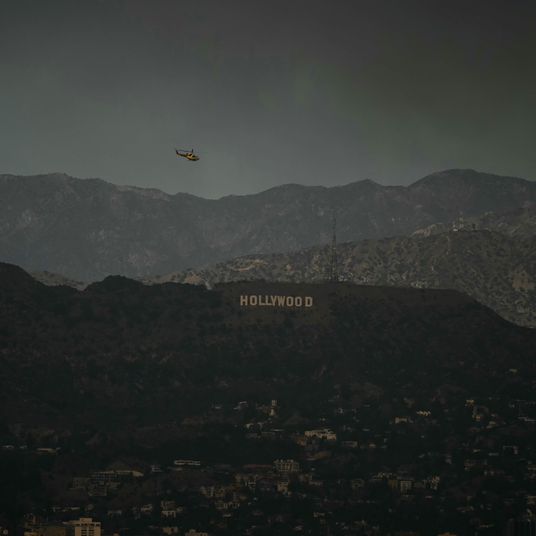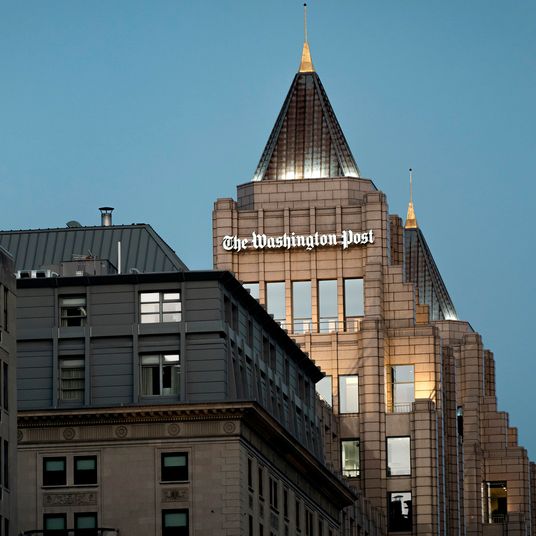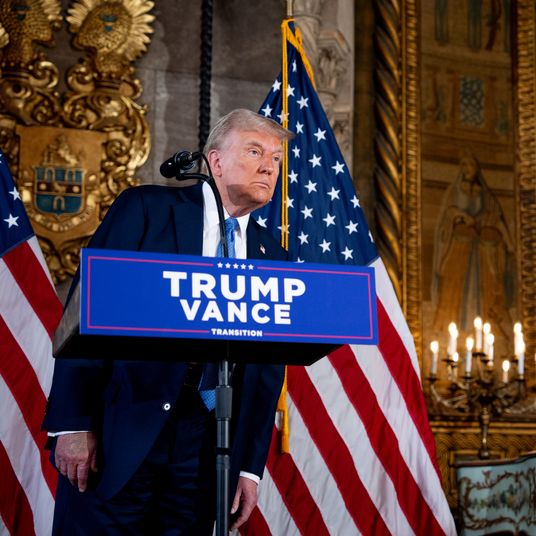
Every week, New York Magazine writer-at-large Frank Rich talks with contributor Eric Benson about the biggest stories in politics and culture. This week: Lara Logan apologies for her Benghazi report, Bill Clinton calls for Obamacare changes, and The New Republic forwards Elizabeth Warren as the anti-Hillary.
On Sunday, CBS News correspondent Lara Logan issued a short and, many commentators felt, insufficient apology for her now-discredited 60 Minutes report on the Benghazi consulate attack. A year ago, Logan had publicly mocked the notion that the Benghazi attack was a protest gone awry and advocated for a stronger U.S. military response. Should CBS have given her this story? How can Logan or her network satisfactorily explain the botched report? And do you see a double standard at work between Logan’s fate (issuing a halfhearted apology, so far) and Dan Rather’s much harsher penalty for his questionable 60 Minutes report in 2004?
Lara Logan’s story was not a mere journalistic mistake, but a hoax comparable to such legendary frauds as Life magazine’s purchase of the billionaire Howard Hughes’s nonexistent “autobiography” in the seventies and Rupert Murdoch’s similarly extravagant embrace of the bogus Hitler “diaries” in the eighties. In Logan’s case, she perpetrated an out-and-out fictional character: a pseudonymous security contractor who peddled a made-up “eyewitness” account of the murder of four Americans in Benghazi. The point seemed to be to further Benghazi as a conservative political cause (instead, Logan’s hoax boomeranged and extinguished it) and to melodramatically exploit the tragic slaughter of Ambassador Chris Stevens and his colleagues as titillating prime-time network entertainment. Logan’s phony source, who in fact was at a beachside villa and not on site to witness anything, cooked up violent new “details” for the Benghazi narrative that seemed to have been lifted from a Jean Claude Van Damme movie.
Here are a few questions that Logan’s “apology” — every bit as bogus as the story itself — failed to answer. (1) How could Logan (by her own account) have worked “for a year” on this report and not done the elementary cross-checking that allowed Karen De Young of the Washington Post to expose the fraud almost immediately after it aired? Indeed, what was Logan doing during that long year? (2) Why did CBS News trust a reporter with such obvious political agendas? Logan had given an over-the-top red-meat political speech about Benghazi around the time she started pursuing the story a year ago. And she had also maligned the patriotism of the late reporter Michael Hastings when he had the audacity to question the loyalty and judgment of the American General Stanley McChrystal and his cohort in Afghanistan. (3) What was the relationship between Logan, her source, and the source’s publisher, which is also owned by CBS? Accounts of the 60 Minutes scandal keep referring to that publisher as Simon & Schuster, but that’s not strictly accurate. Logan’s source was not being published by the S&S that is bringing out Doris Kearns Goodwin’s new book on Teddy Roosevelt. His book was being published instead by an S&S subdivision, Threshold, whose authors include Glenn Beck, Karl Rove, Mark Levin, Lynne Cheney, and Jerome Corsi, best known for promoting the Swift Boating of John Kerry and the birther conspiracies about Barack Obama. Why would Logan and CBS News be in bed with such a partisan publisher? Who was the editor who vetted the book containing the same hoax that Logan aired on 60 Minutes? (4) Logan said in her apology that it was “a mistake” to have included her source in her report. But as many have asked, what was the report without that source? Inquiring minds do want to know.
CBS News is now stonewalling, refusing to answer tough questions by serious media reporters like Paul Farhi of the Washington Post. That seems another mistake. Stephen Colbert’s devastating parody of the whole incident, with a cameo appearance by Sam Waterston in Newsroom guise, is taking on a viral life of its own. There are so many holes in Logan’s story that other ambitious journalists will race to fill them in. CBS may be trying to enforce a different standard than it did on the Dan Rather–60 Minutes II calamity of 2004, but wishing will not make this one go away.
In an interview released yesterday, Bill Clinton opined that President Obama should put a stop to the Affordable Care Act’s much-publicized insurance-policy cancellations, even though most policy experts agree that they’re necessary for the act to work. Is this just the Big Dog harmlessly shooting off his mouth? Or is the man whom Obama dubbed his “Secretary of Explaining Stuff” once again proving more liability than ally?
With all due respect to the power of Bill Clinton to suck the air out of a 24-hour-news cycle and be the bull in any Democratic china shop, he is not the problem with the Affordable Care Act. The overriding problems are the ineptitude of the rollout and President Obama’s repeated iteration of a promise (that no one will be thrown off an existing policy) that was both false and in fact counter to the whole point of the law. In any case, Clinton’s quick fix would undermine the ACA further, but he’s not alone among Democrats proposing it or something like it: Dianne Feinstein has now embraced a similar notion, and she’s not some outlier but the senior senator of the biggest blue state in the country. None of this noise will make any permanent difference if the Obama administration fixes all the technical screw-ups, and not just the web portal, that have contaminated this law. And of course it will help, too, if the White House comes up with other temporary fixes on policy cancellations (as it seems to be groping for right now). But if the ACA isn’t up and running in a nearly efficient way as we head into the election year of 2014, the law may go down, particularly if a new Congress is swept in that has a shot at dismantling it.
In his current New Republic cover story, Noam Scheiber argues that Massachusetts Senator Elizabeth Warren might capitalize on the Democratic party’s increasing populism and best Hillary Clinton for the presidential nomination. Do you buy Schreiber’s premise that a more populist Democratic party will show up to the primaries in 2016? And do you think that Warren — or another candidate — could ride that wave to a victory over Clinton?
I don’t accept some of the premises here, and like all speculation about 2016, it’s so hypothetical that we will only look back and laugh at all of it in a few years. If we assume that Hillary Clinton is indeed running in 2016 — itself not certain — we can’t have a horse-race narrative in 2013 unless there’s some Democrat who could oppose her as Obama did in 2008. But who? No one believes it will be Joe Biden. Andrew Cuomo can’t challenge her. Who does that leave on the Democratic bench to make this a contest? Well, why not draft Elizabeth Warren to thicken the plot? She’s an enormously appealing, whip-smart champion of populist ideas, from serious banking-financial-regulatory reform to the full spectrum of issues pertaining to economic inequality, that have been slighted (or worse) by the Lawrence Summers–Robert Rubin–Wall Street culture that has dominated policy-making in both the Bill Clinton and Obama administrations. But does Warren show any signs of (or even passing interest in) running for president? No. Could a Massachusetts liberal be an effective national candidate? Probably not. Still, let’s hope she does run if only, as everyone says, to galvanize an overdue economic debate. But in truth, that debate is going to come whether Warren runs or not: Populism is just as hot a force, albeit with different parameters, in the GOP base as it is among Democrats. The bigger story of American politics to come has less to do with the presidential horse race than with a pattern that has emerged steadily since the 2008 financial meltdown: The economic grievances that fueled Occupy Wall Street and the tea party are two sides of the same coin, and someone in one party or the other is going to figure out how to harness that crossover political constituency.
Yesterday NBC released a poll in which it asked respondents to choose between 2016’s presumptive nominees du jour Hillary Clinton and Chris Christie. (Clinton came out ahead 43 percent to 33 percent.) Which would be a better race for this country: Clinton vs. Christie or Elizabeth Warren vs. Ted Cruz?
Excuse me for being a stickler on this point, but I see zero chance that Chris Christie could be nominated for president by the GOP unless the entire Republican convention is controlled by his unofficial campaign organization, MSNBC’s Morning Joe. The base of the GOP — the activist base that will actually vote in primaries and caucuses — loathes Christie and much of the squishy conservatism he stands for. He will fare no better with this base than Rudy Giuliani did, and Rudy at least had 9/11 at his back. In any case, your theoretical Clinton vs. Christie race would be all too predictable and tedious in style and substance, if not outcome. On the other hand Warren vs. Cruz, while also implausible, would be one hell of a ride. Or what about Rand Paul vs. Wendy Davis? Three years until Election Day, why not dream?
* An earlier edition of this piece stated that Mary Matalin was editor-in-chief of Threshold Editions. She still consults for the company but no longer holds that title.






























